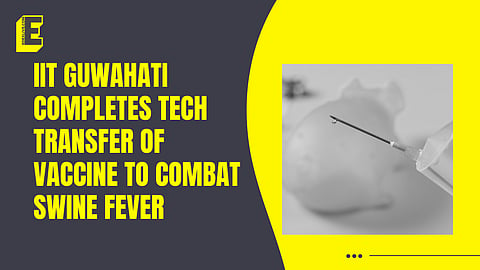

Indian Institute of Technology (IIT), Guwahati has successfully transferred a 'pioneering' vaccine technology to a manufacturing company that specialises in high-quality vaccinations for treating the swine fever virus in pigs and wild boars, according to a press release issued by the institute on Tuesday, March 26.
This vaccine is the first recombinant virus-based treatment for classical swine fever produced in India, providing a quick and cost-effective technique of pig vaccination, PTI reports.
The technology has been successfully transferred to BioMed, which will produce the novel vaccine commercially, according to the statement. The pig vaccine uses a reverse genetic platform developed and perfected at IIT Guwahati.
Though it doesn't harm people, swine fever is a highly contagious disease that poses a serious threat to livestock and has a high death rate.
Cases of this disease have been reported often in India's northeast as well as in Bihar, Kerala, Punjab, Haryana, and Gujarat, to name a few states.
Researchers from Assam Agricultural University in Guwahati and the Department of Biosciences and Bioengineering at IIT Guwahati collaborated to begin the vaccine project between 2018 and 2019.
The results of their research have been featured in two papers published in the journals Archives of Virology and Process Biochemistry.
India is the country where this vaccine is being developed and made for the first time. According to the statement, it is a tremendous accomplishment that the vaccine technology has been transferred to one of the industry leaders in veterinary vaccines.
It further stated that the vaccine is currently undergoing the process of obtaining a test and analysis licence.
One effective technique and tool for creating vaccinations against diseases that affect both humans and animals is reverse genetics.
The method has been widely applied in the creation of influenza vaccinations.
The essential proteins of the classical swine fever virus are carried by the Newcastle disease virus (NDV), which has historically been researched for its pathogenicity in chickens.
The announcement further stated that this novel approach is quick and affordable while promoting the body's immunity against illness.
